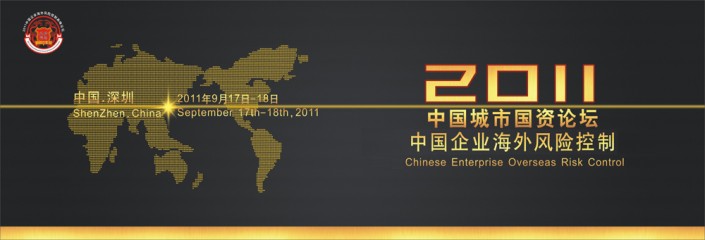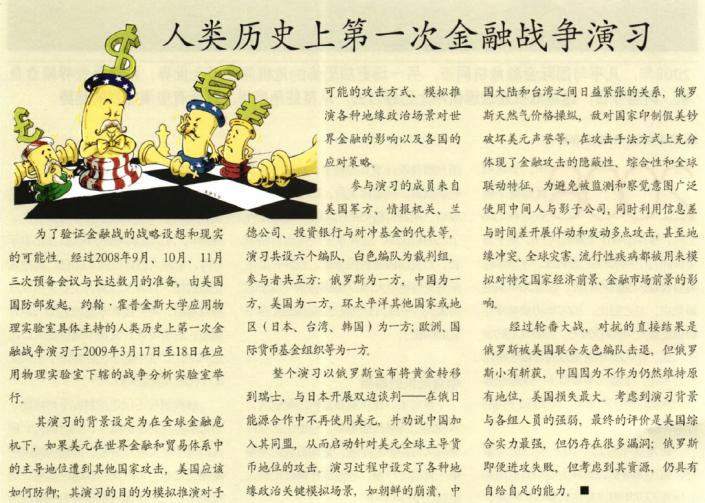China Prepares For Financial Warfare
On 17 and 18 September 2011 a conference on “risk management for Chinese corporations" was held in Shenzen, China, organized by the research center of the State-owned Assets Supervision and Administration Commission of the State Council (SASAC).
An introduction of a few speakers:
General Qiao Liang, who wrote this book.
Mei Xinyu, researcher at the Chinese Academy of International Trade and Economic Cooperation (CAITEC).
Zhang Jie, famous financial critic (I’ve published a translation of his work here), author of A Chinese Businessman Buying Mines in Africa.
Zheng Gang, the CEO of Keen Risk Solution Co. LTD, and consultant member of the Chinese Competitive Intelligence Association.
Bi Yantao, director of China International Institute for strategic Society Spread, director of Hainan University Communication Research Center.
Joshua Kwai, terrorism and security advisory expert, the CEO of JK Consultancy Holdings Pte LTD.
Daniel Mlanao, political risk management professor.
To learn a bit more on what this meeting was about I studied the speakers. What I found were numerous articles on the tension in the power relation between the US and China, something not often thoroughly analyzed by the mainstream media. One article I would like to share, from CEO of Keen Risk Solution, Zheng Gang. Exclusively translated by In Gold We Trust.
(Zheng Gang gave me permission to publish the translation)
Zheng Gang, June 2013 (东方锐眼风险管理顾问公司 Keen Risk Solution)
Before actual combat over land, sea and air, an enemy nation that possesses offensive capabilities in Finance can disrupt China’s economic stability, thereby striking before a physical war, subduing us without a fight.
Financial War: The Invisible Conflict
Despite arising doubt towards the US dollar (USD) as the global reserve currency since the financial crisis in 2008, the USD-centric system of world trade and finance remains an important cornerstone of the post-Cold War global economic order.
The strategic ‘Game’ to preserve the USD’s global status is now focus of international political and economic activity; the US makes a new kind of non-military offensive against developing and transforming countries derived from her ability to set favorable rules, an ability she possesses through
the dollar hegemony.
Game of Nations: New Frontier
Based on historical encounters (like the Soros attack on Southeast Asian countries) the outcome of successful attacks will not be limited to finance. Outcomes include widely deteriorating trade conditions, widespread enterprise bankruptcies, high level of unemployment and escalation into political-social crises. As the globalized economy evolves, securitization of the real economy and the subsequent leverage from financial derivatives can sharply increase risks to economies targeted by financial war. One successful blow is like a ‘targeted killing’ towards an enterprise or even a nation’s economy, followed by a collapse and then regression.
A financial war may not be violent like a physical conflict, but it makes another succumb to one’s will through different means. A political motive exists as well. A financial attack initiated by a nation or a non-national entity are both able to achieve a national strategic intent.
War can be waged by different means these days. When war can also be waged over networks, financial attacks pick up operational characteristics of physical combat, its execution carries high level of antagonism and tactical planning. Central intelligence (easily achieved with the American ‘ revolving door’) gathers weaknesses of targets and makes contingency plans for counter-moves all prior to an offensive. The entire move has qualities of a joint-operation – one single effective financial strike requires different resources, participation from different countries and technical competencies to execute concurrently. Participating forces exercise high level of coordination for sub-agendas, time and location; all very similar to an integrated joint-operation.
An economy is the basis of warfare. If an enemy that possesses financial strike capabilities and overall advantage destroys our financial stability, hurts our economy, shake our people’s faith in the government before the start of traditional land, sea, space and air conflict, he can destroy our stability and achieve victory without fighting or compel us to commence battle under unfavorable conditions. Compared to land, sea, space, air and network battlefield, financial war should be considered a kind of outside attack.
The Modes Of Attack In Financial Warfare
The mode of attack can always be different because the main bodies involved in a financial war can vary. However, the main participants in a financial war are central banks and sovereign funds. For example, the type of attack that worries the US is a massive dumping of USD’s or treasury bonds, or a departure from the US Dollar-centric system when countries sign bilateral currency swap agreements. The US has the means to attack the economies of other nations through quantitative easing, misinformation, local conflicts, inciting public health panic, exerting political pressure, using international bodies to lower credit ratings, etc. The objective of doing so for the US is the preservation of US Dollar hegemony and the revenue from seigniorage that comes along.
Delivering a blow to the opponents economies leads to capital outflow, handicapping said economies’ ability to fight crisis, real economic loss, deteriorating trade conditions, large scale enterprise bankruptcy and unemployment, then ultimately political-social instability; loss of confidence in the government and possibly mistrust in military operations in a targeted country are good preceding conditions for the start of traditional warfare.
Non-national entities consist of hedge funds. Hedge funds target specific enterprises and professions. They seldom attack national entities but the successful raid on Southeast Asian countries and the Bank of England by Soro’s Quantum Fund is an example. Following rapid advancement in the development of financial derivatives, the scale of capital available to hedge funds grew to unprecedented levels; the boundaries of an attack on enterprises and professions in a target country is no longer clear and certain. Shaking the stability of a nation’s economy by targeting enterprises and professions can also be a prelude to total attack. Because the United States has the following, we have seen hedge funds situated in the US carry out short selling in other stock markets:
– The world’s most developed financial system.
– Possesses numerous hedge funds that have powerful information gathering and analytical competency and the ability to deploy capital.
– Controls IMF, World Bank and various international bodies.
– Has many international mainstream media situated within.
The standard procedure used to short sell in a country appears to be:
1. Identify key industries, regulatory controls, investor psychology, information channels as well as overall political, economic and social stability.
2. Identify weakness of key industries, market mispricing.
3. Drive speculative money into said industries via legal channels and illegal ones like black market brokers to inflate stock prices further.
4. Deploy, prepare in advance.
5. At inflated levels, secretly dump stocks in said industries through middle-men and shell companies.
6. Make use of financial analysts, news media to broadcast negative market moving news such as discrediting analysis reports, reporting fraud, negative information of high level management, professional scandal to incite investor panic followed by dumping.
7. Use foreign bodies to cast doubt on regulatory controls, affected NGO’s, media in order to cast doubt on more professions, stock price valuation of more enterprises ultimately cascading into a stock market depression.
8. Exploit local conflicts, incidents to build very bearish forecast of entire economy causing foreign investment to exit the country.
9. When target country’s stock market, currency exchange rates fall to low levels, re-enter the market to buy up and control the entire economy at one fell swoop.
It is worth mentioning that a short seller’s action is unlikely to be unfounded because the target usually has existing problems. The short seller uncoveres these problems through research and then strategized to exaggerate issues at stake, accelerating into crisis or indeed to give problems a friendly push towards bubble-like proportions and finally succumb to self-ignition. In other words if the target economy is a sick man, the short seller deliberately pushes the patient beyond the point of no return at a critical stage. Inherent traits in a target, combined with the secretive, sophisticated methods used, pulls wool over observers so that attention is given to faults of the victim rather than the role the short seller played.
Main Battlefield To Engage China
The first targets in this finance war by foreign participants are Chinese enterprises that have ventured to overseas capital markets. Short selling syndicates represented by Muddy Waters and Citron Research hunt US Chinese listings mercilessly. From 26 April 2011 when Longtop Financial Technologies was first questioned until it stopped trading on 07 December 2012, the NASDAQ ICS30 Index fell 53.25% from 1250.92 points to 584.73. Within 2012 more than 30 Chinese stocks were delisted and the entire market capitalization fell 50.46% from 192.4 billion to 95.3 billion USD. Within a short one and a half years, market capitalization of ICS shrunk 100 billion USD. At the moment, short selling syndicates have set their eyes on Hong Kong listed Chinese enterprises.
Another battlefield is the bond market. Following another quantitative easing to flood the market with US Dollars, China’s holding of US debt faces a huge depreciation.
There is also a battlefield on China’s domestic stock market. China’s manufacturing is slowing down due to rising labor cost and cost of material. The appearance of short selling on index futures could subject A-shares to short selling pressure as well.
At the moment, hot money continues to pour into the country. If domestic politics or economy were to deteriorate or if conflict were to arise in surrounding regions, there is an increasing possibility that Chinese stocks will be short sold.
The last is the battlefield over the Renminbi exchange rate. Slowing growth could lead to rise in inflation and decline in real purchasing power. Renminbi’s current appreciation against the US Dollar means that the former risks over-valuation.
Hot money flowing into China through various channels is now enjoying RMB appreciation but once China’s politics, economy or society becomes unstable, these foreign capital will flow out rapidly and lead to RMB depreciation.
One possibility
Foreign hedge funds are already short selling China’s banking and property stocks. At the moment China’s principal state owned banks are listed overseas. Some of them do not have strong balance sheets because they are affected by a wave of enterprise bankruptcies and a crisis in the property sector.
Two days ago there was also news that the ex-Vice President of Agricultural Bank of China incurred 3 billion RMB gambling debts in Macau. If more of such scandals surface, China’s banking stocks may encounter great volatility. People are also aware of a bubble in China’s property sector. In March 2013, Kynikos Associates President and Founder Jim Chanos, a great short seller whose short sold Enron Corporation as well as US property market, made this claim on CNBC: “China’s property market is the biggest bubble in history". It is foreseeable that China’s middle income should lose confidence in the economy, a big correction in the property market is increasingly likely.
Foreign hedge funds have already sold China’s provincial debts. Short sellers find it hard to penetrate central government’s finances because the latter is backed by the nation’s credit and has strict management controls but provinces have fallen into a vicious cycle of selling land to finance spending.
If there is a prolonged decline in the property market, some of these provinces will not be able to make repayments and finance themselves even through land sales. Such a situation will lead to a rise in bond yields of provincial debts, and difficulties to issue new debt.
Foreign capitalist giants are selling Hong Kong listed Chinese stocks. US-listed Chinese stocks have already gone through a round of merciless take downs. Hong Kong listed Chinese stocks are even more numerous, more diverse. If a third of these were to come under assault, losses will be shocking.
Foreign hedge funds have conspired with domestic collaborators to short sell A-shares using index futures. At the moment, China’s investors are very displeased with fraud within listed companies. Many investment companies are calling for the market liberalization and the establishment of mechanisms for short selling. From market principles’ point of view, this call is reasonable. It is essential however to carry out in-depth studies and trial before liberalization in case foreign players use domestic companies as tools to short sell A-shares maliciously.
Apart from hedge funds that are non-national entities, the US government is not an innocent bystander.
Unsurprisingly quantitative easing is diluting US government debt in China’s possession, yet the US is asking China to carry out financial reform while manipulating political conflict in surrounding regions, raising tension between countries on issues such as the South China Sea, Diaoyu Dao, China-India border dispute and North Korea’s nuclear ambitions. If areas surrounding China were to erupt in crisis today, US hedge funds’ geopolitical analysts certainly have the means to predict and deploy in advance in order to exploit.
In a successful execution foreign hedge funds could launch attacks on China’s different industries, provincial government, Renminbi exchange rate and strategic state owned enterprises. By then China will encounter a challenge to its economy and overall social-political stability.
How should China handle a financial war?
‘Be prepared, do not rely on the enemy not coming’ is ancient wisdom but common sense as well. History taught us to acquire new ideas and concepts but not to ignore old ones.
Place emphasis on the set up of a special system to monitor malicious financial attacks. Both participants and mode of attack in a malicious financial assault may be hidden, though not entirely untraceable. If a monitoring framework can be built to surround potential attackers, targets or modes of attack, intention or preparation for an assault can be detected in advance so that the threat can be categorized and countered accordingly.
Financial warfare is a non-traditional threat that can achieve strategic objectives. Following a financial attack, network-wide assault or military intervention can be expected. A financial attack is an invisible way of fighting which exceeds the boundary of traditional military conflict and therefore there is a lack of monitoring for such a threat at the moment.
Therefore, the need to analyze the link between financial safety and national military safety, quickly putting in place measures to secure both is pressing. An effective course to build offensive/defensive capabilities against a financial war is to gather consensus from different departments on the threat posed by financial attacks, cultivate experts in different domains, design an exercise with critical scenarios to simulate mode of attack, different geopolitical incidents and possible outcomes.
(Author is a researcher with Keen Risk Solution)
INSET
Mankind’s First Financial War Exercise In History
In 2009, the US Pentagon conducted the first financial war game in the world. This simulation exercise was the culmination of months of preparation. It was conducted between March 17-18 in a physics laboratory at the John Hopkins University.
The exercise simulates a global financial crisis where the reserve status role of the US Dollar comes under assault by other nations. Participants must determine what the US should do to defend. The 2-day exercise seeks to find out what modes of attack opponents will adopt through role-playing, how various geopolitical scenarios may affect international finance and what measures nations can adopt.
Participants in the game came from the US military, intelligence service, Rand Corporation, as well as representatives from investment banks and hedge funds. Participants were divided into 6 teams; a white team acted as referee while the 5 other teams were Russia, China, US, Pacific nations (Japan, Taiwan, South Korea) together in one team and Europe and the IMF together in the last team.
This was the game scenario:
1. Russia announces that she will move her gold reserves to Switzerland.
2. Russia conducts bilateral talks with Japan to stop using US Dollar for energy transactions.
3. Russia persuades China to join the arrangement.
These arrangements constitute an assault on the pole position of the USD. Additional scenarios in the simulation included potential collapse of North Korea, rising tension between China and Taiwan, Russia manipulating price of natural gas and opposing countries printing fake US Dollars to spoil its reputation. Modes of attack reflected:
1. The secretive nature of a financial assault.
2. The level of integration the world has arrived.
3. The use of middle men, shadow companies to escape monitoring.
4. Using information-lag and time-lag to carry out feints and attacks on multiple locations.
5. Geopolitical conflicts.
6. Global disasters.
7. Epidemics.
The above were used to simulate outcomes to participating nations economy, financial markets.
After several engagements, Russia was turned back by a US-centered alliance but retains a minor victory. In view of the background of the exercise and the strengths and weaknesses of the participants the US is found to be overall strongest with existing loopholes; Russia may lose but with its own resources remains self-sufficient.
In Gold We Trust
Popular Blog Posts by Koos Jansen
 China’s Secret Gold Supplier is Singapore
China’s Secret Gold Supplier is Singapore
 Audits of U.S. Monetary Gold Severely Lack Credibility
Audits of U.S. Monetary Gold Severely Lack Credibility
 China Gold Import Jan-Sep 797t. Who’s Supplying?
China Gold Import Jan-Sep 797t. Who’s Supplying?
 The Gold-Backed-Oil-Yuan Futures Contract Myth
The Gold-Backed-Oil-Yuan Futures Contract Myth
 Estimated Chinese Gold Reserves Surpass 20,000t
Estimated Chinese Gold Reserves Surpass 20,000t
 Did the Dutch Central Bank Lie About Its Gold Bar List?
Did the Dutch Central Bank Lie About Its Gold Bar List?
 PBOC Gold Purchases: Separating Facts from Speculation
PBOC Gold Purchases: Separating Facts from Speculation
 U.S. Mint Releases New Fort Knox Audit Documentation
U.S. Mint Releases New Fort Knox Audit Documentation
 China Net Imported 1,300t of Gold in 2016
China Net Imported 1,300t of Gold in 2016
 Why SGE Withdrawals Equal Chinese Gold Demand and Why Not
Why SGE Withdrawals Equal Chinese Gold Demand and Why Not






 Koos Jansen
Koos Jansen













